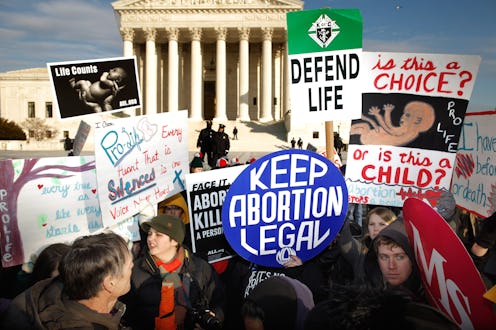News
Texas Takes Abortion To The Supreme Court
Texas now has eight abortion clinics left, thanks to a new federal court ruling — but women in the Lone Star State are not going quietly. Attorneys representing Texas abortion providers filed an emergency Supreme Court petition on Monday, requesting an injunction that would keep the state's embattled clinics open until all appeals are finished. It's the latest battle in the ongoing showdown between Texas lawmakers and women seeking abortions in the state.
Last Thursday, a panel of the U.S. Court of Appeals for the Fifth Circuit overruled an Aug. 29 ruling from U.S. District Judge Lee Yeakel, who instated a permanent injunction on a provision requiring all abortion clinics to be ambulatory surgical centers — a provision that the American Congress of Obstetricians and Gynecologists even called "over-reaching" and "not based on sound science." Following the Fifth Circuit's decision, which took effect immediately, Texas went from having more than 20 abortions to just eight overnight.
According to the Center for Reproductive Rights, the new Fifth Circuit ruling also repealed Yeakel's injunction on the admitting privileges requirement for two clinics: Whole Women's Health in McAllen and Reproductive Services in El Paso. Reproductive Services had already closed earlier this year, but Whole Women's Health reopened its doors in the Rio Grande Valley in early September. The clinic was the last abortion provider in the vast rural region adjacent to the Mexico border. Without Whole Women's Health, Rio Grande Valley women seeking abortions will now have to travel nearly 500 miles roundtrip to San Antonio.
In their 50-page emergency application, attorneys for the Center for Reproductive Rights argue that the shuttered clinics will likely never reopen, leaving one million Texas women with a 300-mile roundtrip to an abortion provider:
Further, women's ability to exercise their constitutional right to obtain an abortion will be lost, and their lives will be permanently and profoundly altered. Public health will also be adversely impacted. Texas has already seen a surge in illegal abortion in areas where legal abortion services are no longer available, and that trend will continue if the stay remains in place.
Attorneys for the Center for Reproductive Rights also allege that the Fifth Circuit "glossed over the true basis for the law," which abortion-rights activists claim wasn't women's health or safety, but to prevent women from obtaining abortions. The petition states that both the law's defendants and the panel of judges ignored testimonies from medical experts, as well as statistical evidence that showed the impact the lack of abortion access would have on low-income women, and women living in the Rio Grande Valley and West Texas.
The petition states:
As reflected in the district court’s factual findings, their testimony failed to rebut extensive evidence that the regulations will provide no health benefits to abortion patients and will actually result in greater health risks for many women. ... Defendants argue that no evidence is necessary to justify the regulations. Instead, they contend “rational speculation” that the regulations might provide a health benefit is sufficient to deprive millions of Texas women of meaningful access to abortion services.
There are more than five million women of reproductive age in the Lone Star State, which means one in five Texas women now face incredible obstacles if they ever need to obtain an abortion. "Every hour that these clinics are closed adds to the number of women, many facing urgent circumstances, who will be denied essential care and their constitutional rights," said Center for Reproductive Rights CEO Nancy Northup.
Texas women, especially those who live outside the metropolitan areas of Houston, Dallas and Austin, are already feeling the crippling impact of the stringent anti-abortion law and ensuing court decisions. Women who had appointments at jeopardized clinics, including Whole Women's Health, found themselves out of luck on Friday, arriving at their clinics to only be told that their procedures were canceled.
Elvia Yamell Hamdan of Rio Bravo told The New York Times that she was surprised to find Whole Women's Health in McAllen no longer operating, even though she had an appointment on Friday. "When I got here, I found out the law had changed yesterday," Hamdan said. “I thought, ‘How is that possible?’"
Hamdan, who already has four children and three grandchildren, was told she would have to travel to San Antonio in three weeks for the procedure. She won't be the last Rio Grande Valley woman making that long haul. Images: Getty Images (3)
